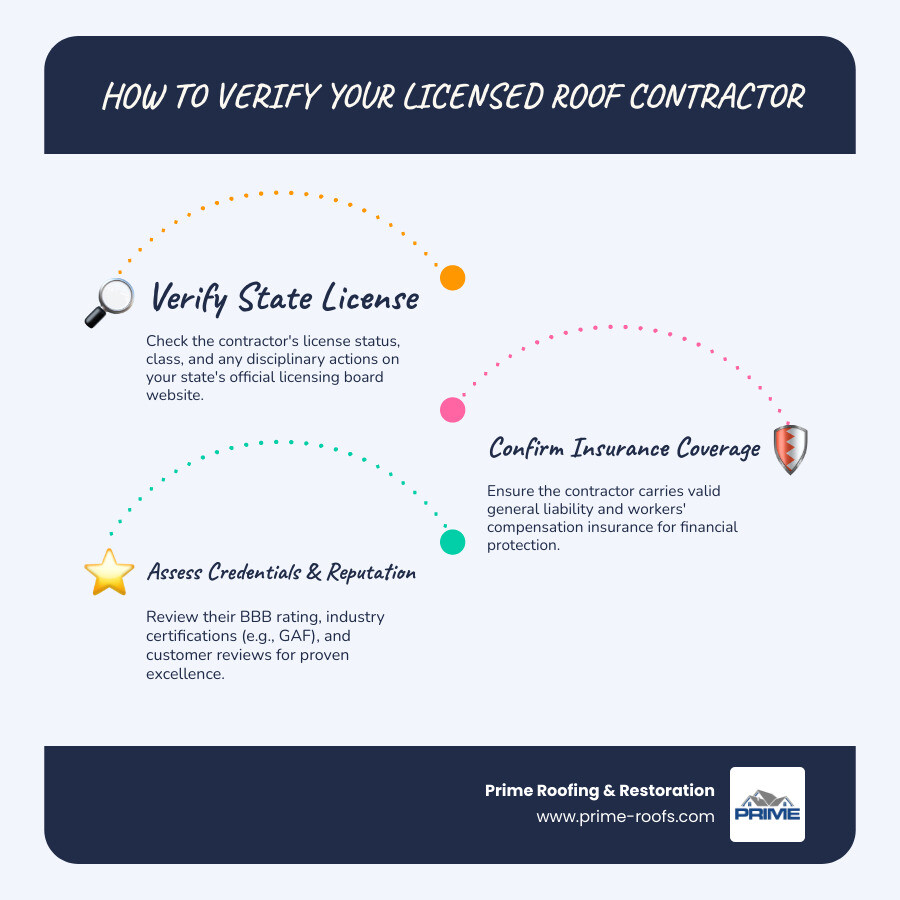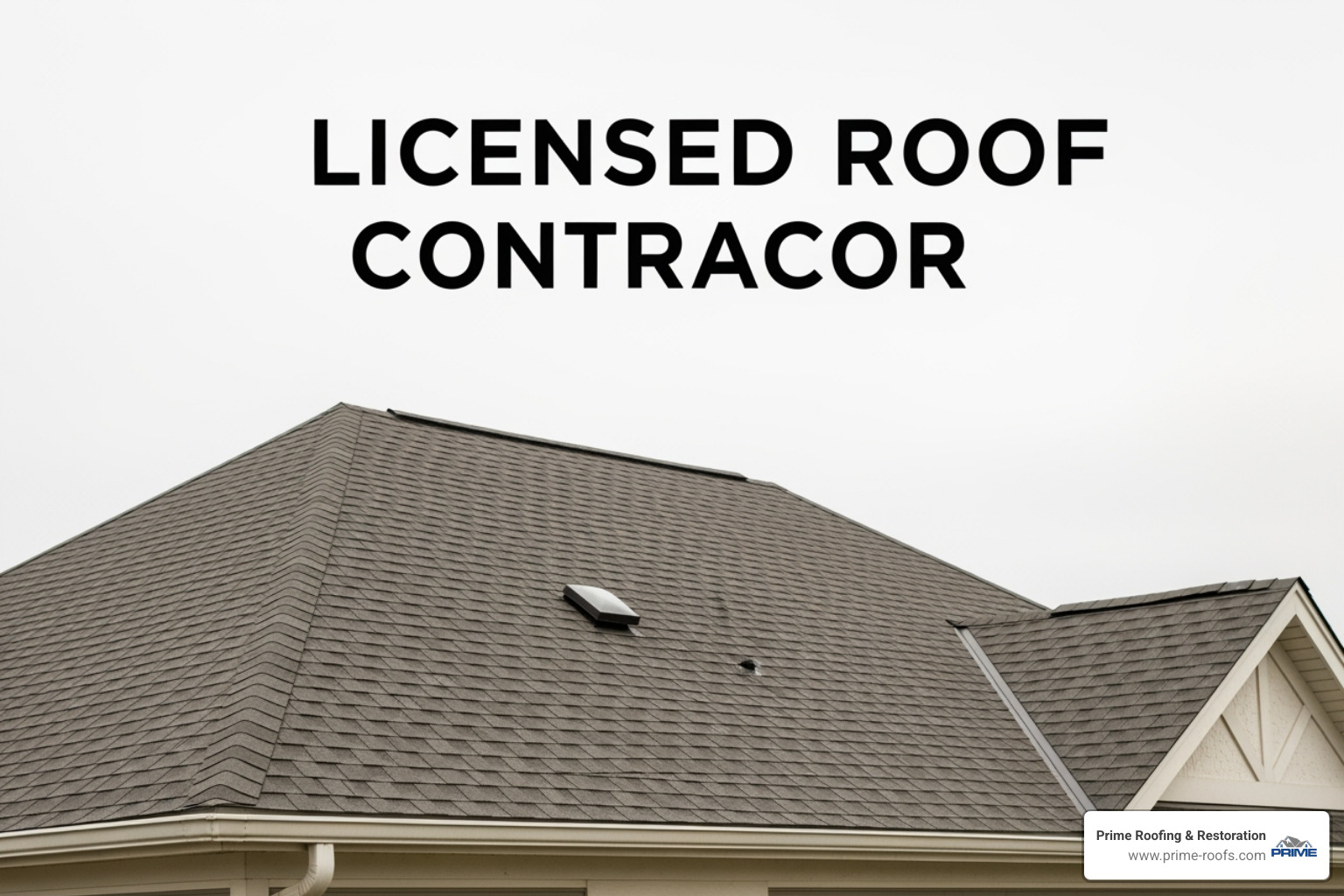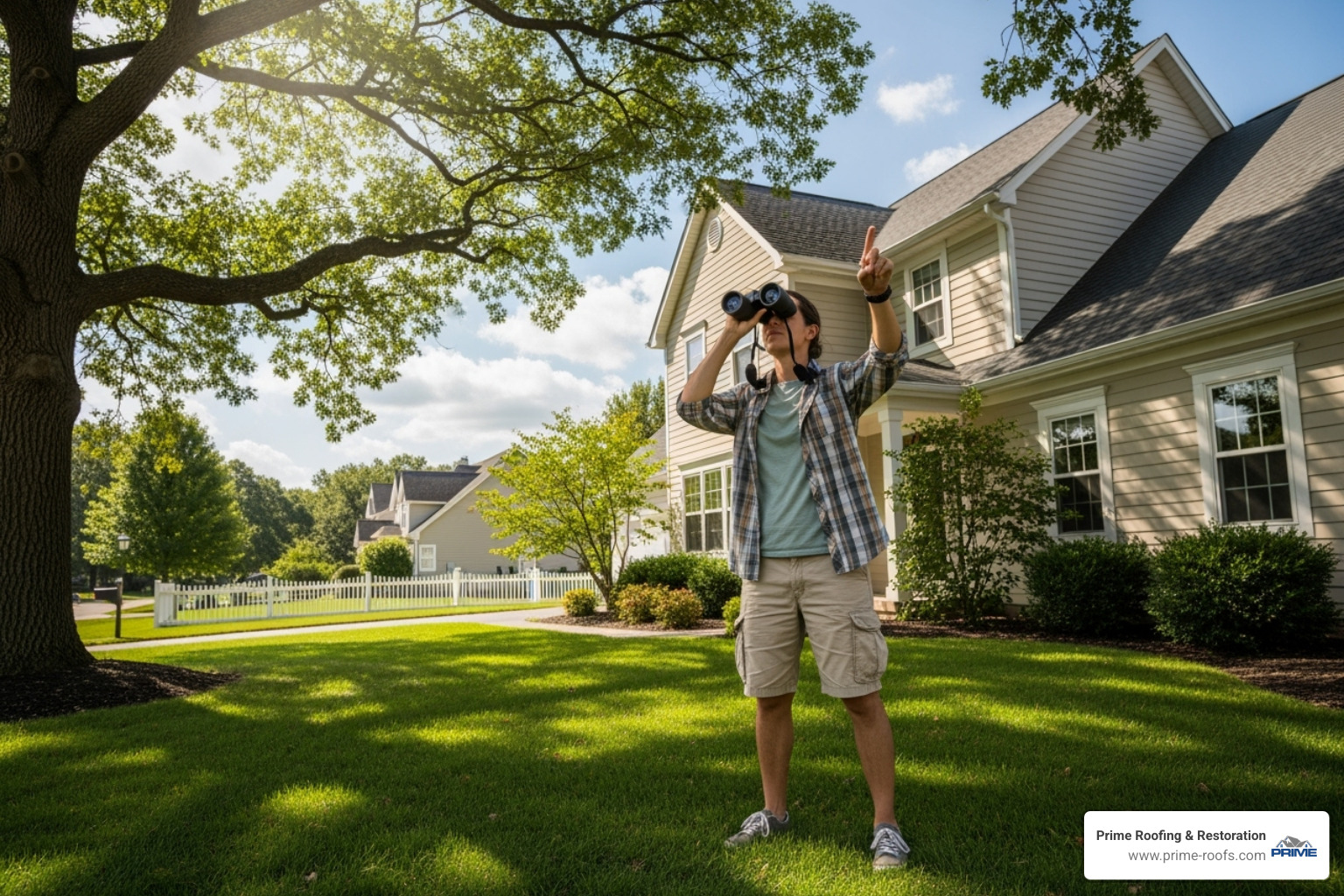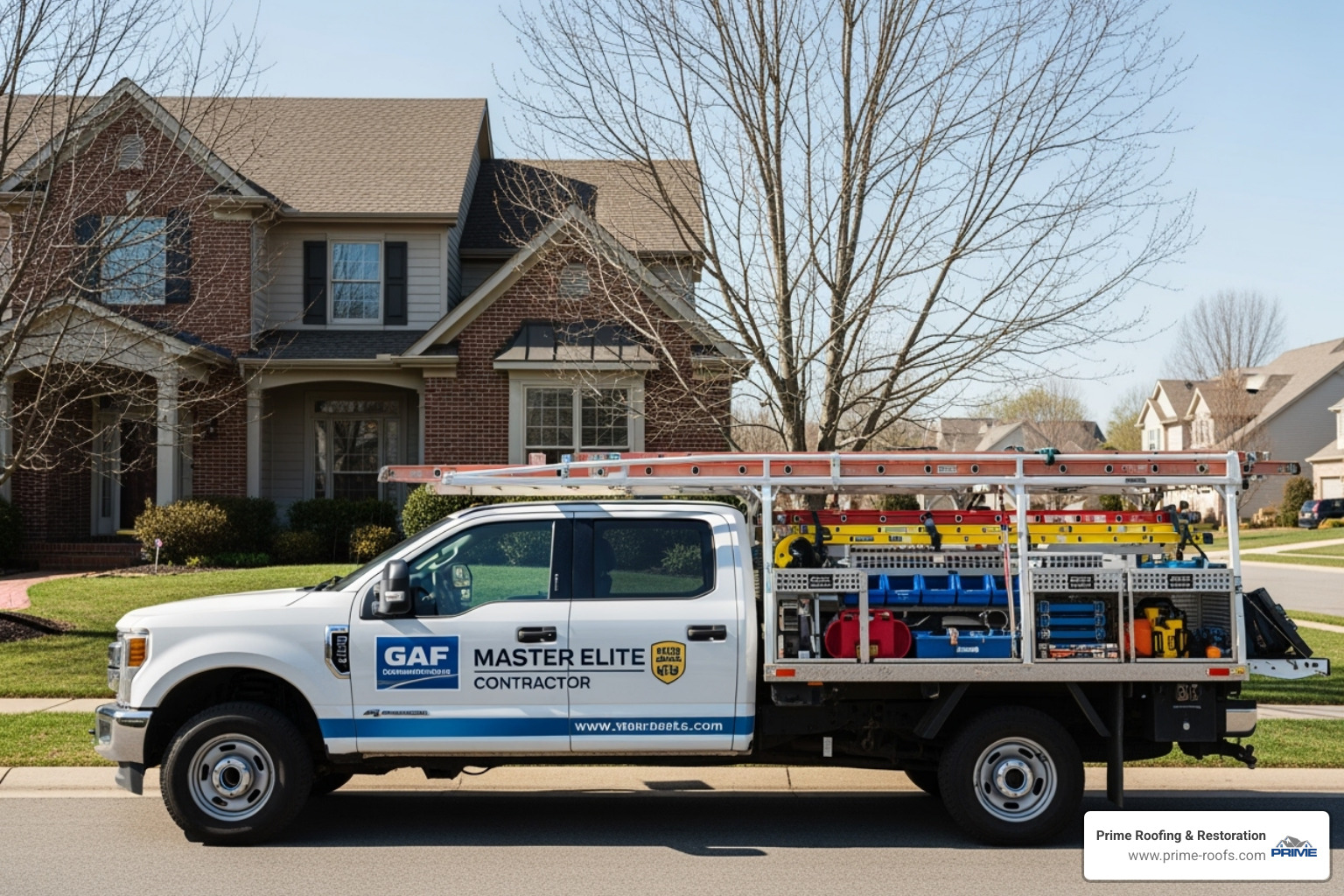Why Choosing a Licensed Roof Contractor Protects Your Alabama Home
A licensed roof contractor is your first line of defense against poor workmanship, financial loss, and legal liability when facing roof repairs or replacement. For Alabama homeowners, partnering with experienced roofing professionals ensures your project meets all state requirements while delivering the quality and peace of mind you deserve. Licensed contractors must meet strict state requirements before they can legally work on your roof, including:
- A state-issued contractor license
- Specialty roofing certification
- Proof of liability and workers’ compensation insurance
- Passing scores on state examinations
- Verified experience and financial stability
When storm damage strikes your Alabama home, the difference between hiring a licensed professional and an unlicensed contractor can mean thousands of dollars in additional costs and insurance complications. Understanding these licensing requirements helps you make informed decisions about roof replacement services that protect both your investment and your family’s safety.
I’m Bill Spencer, Owner and President of Prime Roofing & Restoration, and as a licensed roof contractor (License #30275) with over five years of experience serving Alabama’s Gulf Coast region, I’ve seen how proper licensing protects both contractors and homeowners. My commitment to maintaining strict compliance with the Alabama Home Builders Licensure Board ensures every project meets the highest standards for safety and quality.

The Critical Importance of a State License

When you’re facing a roofing project, hiring a licensed roof contractor isn’t just about checking a box; it’s a smart decision that protects your family, home, and money. A state-issued license is your contractor’s diploma – it proves they’ve passed the tests and earned the right to work on your most valuable asset. It represents credibility, knowledge, and commitment. With the roofing industry projected to grow by 6% nationally by 2033, it’s crucial to separate qualified professionals from those who just show up with a truck and tools.
Benefits for the Homeowner
Choosing a licensed roof contractor provides a critical safety net.
- Consumer Protection & Financial Security: You’re working with someone under regulatory oversight who carries the proper bonding and insurance. This protects your investment from damages or workmanship issues, so you aren’t left with the bill if something goes wrong.
- Workmanship Quality & Code Compliance: Licensed contractors have proven their competency through testing and experience. They understand local building codes and industry best practices, ensuring your roof is safe, structurally sound, and built to last.
- Insurance Validation: Many homeowner’s insurance policies will only honor claims for work performed by licensed contractors. This is especially important after storm damage, where a claim could be denied simply because you hired an unlicensed worker. When you’re ready to make the right choice, these factors are essential for choosing a roofer who protects your interests.
Why Licensing Matters for the Contractor
For a contractor, a license is a powerful business investment.
- Business Legitimacy & Credibility: A license immediately distinguishes serious professionals from fly-by-night operators. This builds consumer trust and improves their professional reputation within the industry, leading to better supplier relationships and referral networks.
- Higher Earning Potential & Better Projects: Legitimacy allows licensed contractors to command fair prices for their verified expertise. It also provides access to larger projects, including commercial jobs and insurance work that require specific qualifications, allowing their business to grow.
A Deep Dive into Contractor Licensing (A State-by-State View)

Every state handles contractor licensing differently, but understanding a comprehensive system can help you know what to look for anywhere. Virginia’s framework, managed by the Virginia Department of Professional and Occupational Regulation (DPOR), is a great example of a well-organized system that protects consumers. Its tiered approach classifies contractors by project value and specialty, making it easy to see if a contractor is qualified for your specific job.
License Classes: What Do They Mean?
Many states use a tiered licensing system to match a contractor’s qualifications to the project’s scope. Generally, these classes are based on project value, experience, and financial stability.
- Top-Tier (e.g., Class A): For the largest projects, requiring the most experience (e.g., five years) and highest net worth. This is the level you want for major roof replacements or extensive storm damage restoration.
- Mid-Tier (e.g., Class B): Covers most standard residential projects. These contractors have several years of proven experience and meet solid financial requirements.
- Entry-Tier (e.g., Class C): For smaller jobs and repairs, requiring a couple of years of experience.
These project value limits and financial requirements ensure a contractor has the resources and expertise to complete your job successfully and stand behind their work.
The Path to Becoming Licensed
Becoming a licensed contractor is a rigorous process designed to weed out unqualified applicants. Key steps often include:
- Pre-license Education: A required course covering business practices, state laws, and regulations.
- Experience Verification: Documented proof of hands-on experience in the trade.
- State Examinations: Comprehensive, often open-book tests (like the PSI exams) covering business law and technical trade knowledge.
Understanding Specialties
Beyond a general license, look for specialty designations. A Roofing (ROC) specialty confirms the contractor has demonstrated specific expertise in installing, repairing, and improving roofing systems. While a general Home Improvement or Residential Building contractor may be qualified, a roofing specialist has proven knowledge in keeping your home watertight and weather-resistant. A quality contractor will also handle all necessary roofing permits as part of their service, separating them from those who cut corners.
A Homeowner’s Guide to Roof Health and Hiring

Being a smart homeowner means staying ahead of problems. Beyond knowing what makes a licensed roof contractor qualified, you need to recognize when your roof is crying for help and how to steer the hiring process, especially after a storm when questionable contractors appear.
Telltale Signs Your Roof Needs Professional Attention
- Missing or Damaged Shingles: Bald patches on your roof or shingles in the yard are an obvious red flag. Likewise, shingles that are curling, buckling, or cracked have reached the end of their life.
- Granules in Gutters: These ceramic granules protect shingles from UV rays. Finding a large amount in your gutters means your roof’s protective layer is wearing away.
- Water Stains on Ceilings: Brown or yellow stains are proof that water is getting in, potentially causing mold and structural damage.
- Sagging Roof Deck: Any visible dip in your roofline indicates a serious structural problem that needs immediate expert attention.
- Age: Most asphalt shingle roofs last 20-25 years. If your roof is approaching this age, it’s time for a professional inspection, even if it looks fine from the ground.
Post-Storm Action Plan
- Safety First: If you see major structural damage or downed power lines, get your family to safety and call for help.
- Document the Damage: Take plenty of photos and videos of both exterior and interior damage for your insurance claim.
- Contact Your Insurer: Start the claims process as soon as possible.
- Get Multiple Estimates: Contact at least three reputable, licensed roof contractors for detailed estimates on the same scope of work.
- Beware of Storm Chasers: Be wary of out-of-state contractors who knock on your door after a storm. Always verify their license, insurance, and local references.
Common Scams and How to Avoid Them
- High-Pressure Sales: Legitimate professionals give you time to decide. Avoid anyone demanding an immediate signature or offering a price that’s only good “today.”
- “Too Good to Be True” Prices: Unusually low bids often mean cheap materials, shoddy work, or hidden costs later.
- Large Upfront Payments: A small deposit (10-30%) is normal, but demanding a large percentage or full payment upfront is a major red flag.
- Unsolicited Offers: Be skeptical of door-to-door contractors. Do your own research instead of hiring whoever shows up.
- No Physical Address: A real business has a verifiable local address, not just a P.O. box or a cell phone number. A quality licensed roof contractor will be transparent and patient.
Vetting Your Contractor: Beyond the State License

A state license is the starting point, but the best licensed roof contractors go further to prove their commitment to excellence. Third-party certifications and a stellar reputation translate into real benefits for you, including better materials, extended warranties, and peace of mind.
The Role of the Better Business Bureau (BBB)
The BBB is a valuable tool for vetting contractors.
- BBB Ratings (A+ to F): These grades are based on factors like complaint history and business transparency. An A+ rating signifies a business that consistently prioritizes customer satisfaction.
- BBB Accreditation: Accredited businesses commit to a higher standard of ethical practices, including honest advertising and responsive customer service.
- Complaint History: The BBB website shows you how a business handles complaints. Seeing a contractor resolve issues professionally is a strong positive signal. You can easily find local contractors on BBB.org and filter by rating, location, and specialty.
What Do GAF Certifications Mean?
GAF is North America’s largest roofing manufacturer, and its certifications are a mark of distinction.
- GAF Certified™: To earn this, a contractor must be properly licensed, insured, and have a proven reputation for quality work. This gives you access to improved GAF warranties.
- GAF Master Elite®: This exclusive status is earned by only the top 2% of roofing contractors nationwide. These contractors undergo continuous professional training to stay current on the best installation techniques.
The biggest advantage for homeowners is the Golden Pledge® Limited Warranty, which only Master Elite® contractors can offer. It covers both material defects and the contractor’s workmanship for up to 25 years—a level of protection you can’t get from non-certified roofers. Choosing a GAF-certified contractor means you’re hiring an expert partnered with an industry leader. For more details, you can download the GAF shingle guide to see exactly what premium materials and warranties are available for your project.
Frequently Asked Questions about Licensed Roof Contractors
When you’re facing a major roofing decision, it’s natural to have questions. Here are answers to the most common concerns about hiring a licensed roof contractor.
How can I verify a contractor’s license?
The most reliable way is to use your state’s official online licensing database. In Alabama, you can check licenses through the Alabama Home Builders Licensure Board. Never take a contractor’s word for it or rely on a paper copy they provide, as it could be fake or outdated. A quick online check takes minutes and confirms their license is active, their classification, and if they have any disciplinary actions against them. Any legitimate contractor will encourage you to verify their credentials.
Does a licensed roofer need to pull a permit?
Almost always, yes. Most significant roofing work, especially a full replacement, requires a building permit from your local city or county. Permits are your safety net, ensuring the project meets local building codes and safety standards. A reputable licensed roof contractor will handle the entire permitting process for you as part of their service. Be very wary of any contractor who says a permit isn’t needed or suggests skipping it to “save money,” as unpermitted work can lead to fines and insurance claim denials.
What’s the difference between a licensed contractor and an insured one?
This is a critical distinction. They are both essential but protect you in different ways.
- Licensing proves competency. It means the contractor has met state requirements for experience, passed exams, and demonstrated they have the knowledge to do the job correctly.
- Insurance provides financial protection. It covers costs if something goes wrong. General liability insurance covers damage to your property, while workers’ compensation covers injuries to the crew, protecting you from being held liable.
You should never hire a contractor who lacks either licensing or proper insurance. Together, they ensure you get quality work from a professional who can cover any accidental damages.
Your Partner for a Secure Roof in Alabaster, AL
Choosing a licensed roof contractor who is also insured and certified is the most important step in protecting your home. The complexities of licensing, materials, and installation demand a professional with proven expertise. By understanding what a license represents and what questions to ask, you can hire with confidence and avoid the costly mistakes that plague so many homeowners.
When you need a full roof replacement in Alabaster, AL, partnering with a local team that values integrity and quality is absolutely key. At Prime Roofing & Restoration, we are your trusted local experts, committed to protecting your home with the highest standards of professionalism and care. We handle everything from navigating insurance claims to securing proper permits, so you can focus on what matters most—your family.
Contact our Alabaster team today for a free inspection and experience the Prime difference. We’re here to provide end-to-end solutions that stand the test of time.
Prime Roofing & Restoration
106 Whippoorwill Ln
Alabaster, AL 35007
(205) 606-8888
